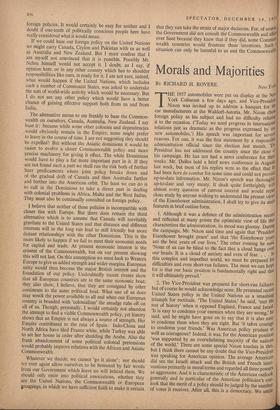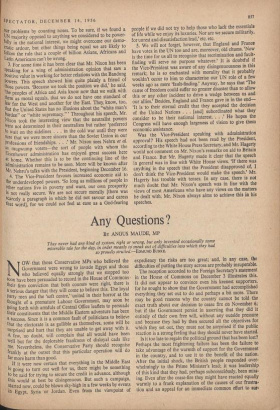Morals and Majorities
BY RICHARD H. ROVERE New Y (0 THE 1957 automobiles were put on display at the New York Coliseum a few days ago, and Vice-President Nixon was invited up to address a banquet for the car manufacturers at the Waldorf-Astoria. Mr. Nixon chose foreign policy as his subject and had no difficulty relatin it to the occasion. (`Today we need progress in international relations just as dramatic as the progress ekpressed by 011', new automobiles.') His speech was important for several reasons. For one, it was the first statement by a responsible administration official since the election last month. The President has not addressed the country since the close el his campaign. He has not had a news conference for thee' weeks. Mr. Dulles held a brief news conference in Augusta last week, but most of his replies were to the effect that he had been hors de combat for some time and could not provide up-to-date information. Mr. Nixon's speech was thorough') up-to-date and very meaty. It dealt quite forthrightly With almost every question of current interest and would repaY close study by anyone wishing to understand the present views of the Eisenhower administration. I shall try to give its male features in brief outline form.
1. Although it was a defence of the administration record and reflected at many points the optimistic view of life that characterises the administration, its mood was gloomy. During the campaign. Mr. Nixon said time and again that 'President Eisenhower brought peace' and that 'the Eisenhower years are the best years of our lives.' The other evening he said' `None of us can be blind to the fact that a cloud hangs over our heads. It is a cloud of anxiety and even of fear. . . . In this complex and imperfect world, we must be prepared for difficulties and even short-run failures. The most we can hope for is that our basic position is fundamentally right and that it will ultimately prevail.'
2. The Vice-President was prepared for short-run failures, but of course he would acknowledge none. He presented recent United States policy in the United Nations as a smashing triumph for rectitude. 'The United States,' he said, 'met the test of history' when it opposed England, France and Israel. `It id easy to condemn your enemies when they are wrong,' he said, and he might have gone on to say that it is also easY to condemn them when they are right. But 'it takes courag to condemn your friends.' Was American policy prudent as well as courageous? Indeed, it was, for the American position `was supported by an overwhelming majority of the nations of the world.' There are some special Nixon touches in this. but I think there cannot be any doubt that the Vice-President was speaking for American opinion. The average American did see the Israeli attack and the British and French inter' ventions primarily in moral terms and regarded all three powers as aggressors. And it is characteristic of the American outlook generally and in particular of the American politician's out look that the merit of a policy should be judged by the number of votes it receives. After all, this is a democracy. We settle our problems by counting noses. To be sure, if we found a LIN majority opposed to anything we considered to be power- fully in the national interest, we might overcome our demo- cratic ardour, but other things being equal we are likely to follow the rule that a couple of billion Asians, Africans and Latin Americans can't be wrong.
3. For some time it has been clear that Mr. Nixon has been speaking for a wing of administration opinion that saw a Positive value in working for better relations with the Bandung Powers. This speech showed him quite plainly a friend of those powers. 'Because we took the position we did,' he said, the peoples of Africa and Asia know now that we walk with them as moral equals, that we do not have one standard of law for the West and another for the East. They, know, too, that the United States has no illusions about the "white man's burden" or "white supremacy."' Throughout his speech, Mr. Nixon took the interesting view that the neutralist powers Were not determined in their neutralism but rather 'preferred to wait on the sidelines . . . in the cold war until they were sure that we were more sincere than the Soviet Union in our Professions of friendships. . . .' Mr. Nixon sees Nehru et al. as mugwump voters—the sort of people with whom the Eisenhower administration has enjoyed great success here at borne. Whether this is to be the continuing line of the administration remains to be seen. More will be known after Mr. Nehru's talks with the President, beginning December 16.
4. The Vice-President favours increased economic aid to the underdeveloped powers. `So long as millions of people in other nations live in poverty and want, our own prosperity is not really secure. We are not secure morally [there was scarcely a paragraph in which he did not savour and caress that word], for we could not feel at ease as a God-fearing people if we did not try to help those who lack the essentials of life while we enjoy its luxuries. Nor are we secure militarily. for unrest and dissatisfaction lead,' etc. etc.
5. We will not forget, however, that England and France have votes in the UN too and are, moreover, old chums. 'Now is the time for us all to recognise that recrimination and fault- finding will serve no purpose whatever.' It is doubtful if the Vice-President was aware of any disingenuousness in this remark; he is so enchanted with morality that it probably wouldn't occur to him to characterise our UN role of a few weeks ago as mere 'fault-finding.' Anyway, he says that 'The cause of freedom could suffer no greater disaster than to allow this or any other incident to drive a wedge between us and our allies.' Besides, England and France gave in in the end— 'It is to their eternal credit that they accepted the decision of the United Nations . . . [and] subordinated what they consider to be their national interest. . . .' He hopes the Congress will have enough largeness of vision to give them economic assistance.
Was the Vice-President speaking with administration approval? His speech had not been read by the President, according to the White House Press Secretary, and Mr. Hagerty would not comment on Mr. Nixon's remarks on aid to Britain and France. But Mr. Hagerty made it clear that the speech in general was in line with White House views. 'If there was anything in the speech that the President disapproved of, I don't think the Vice-President would make the speech.' Mr. Hagerty has trouble with tenses. In any case, there is not much doubt that Mr. Nixon's speech was in line with the views of most Americans who have any views on the matters he dealt with. Mr. Nixon always aims to achieve this in his speeches.











































 Previous page
Previous page